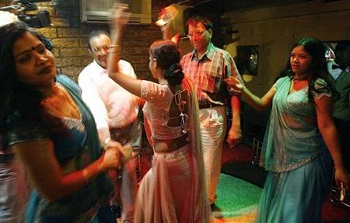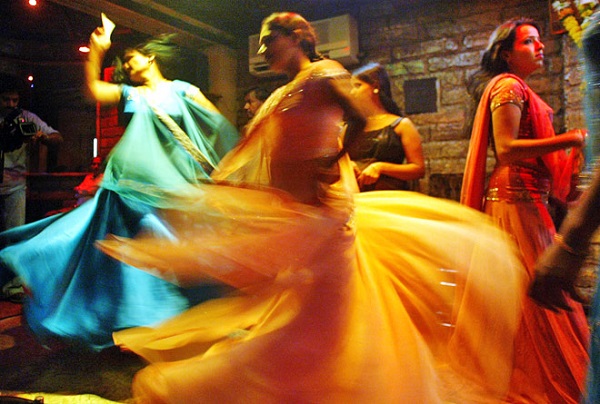What did shutting down of dance bars accomplish? Since when have laws determined what society will or will not do?
by Jatin Sharma
 A recent Supreme Court judgement now allows dance bars to be run in Maharashtra. Needless to say, several bar dancers and bar owners rejoiced at the judgement – bar dancers and activists have constantly been alleging that dancers were forced into prostitution because of the Government’s decision to close down dance bars. However, the State Government alleged that dance bars were the operating units of the flesh trade. But now that the SC verdict is out, it’s going to be the Supreme court v/s the Maharashtra Government. Whatever the end result may be, the Government is not going to make it easy for the dance bars to operate in the state.
A recent Supreme Court judgement now allows dance bars to be run in Maharashtra. Needless to say, several bar dancers and bar owners rejoiced at the judgement – bar dancers and activists have constantly been alleging that dancers were forced into prostitution because of the Government’s decision to close down dance bars. However, the State Government alleged that dance bars were the operating units of the flesh trade. But now that the SC verdict is out, it’s going to be the Supreme court v/s the Maharashtra Government. Whatever the end result may be, the Government is not going to make it easy for the dance bars to operate in the state.
I am very interested in the politics of moral policing. How every time our netas stand up to make our society better, tell us how we should behave and how they know what a perfect society is. As an aside, isn’t stopping corruption and not laundering money also something that speak of an honest society?
However, what’s funny is that these kind of judgements neither create nor dismantle a society. Every time the Government makes a decision  that is repressive (or liberating, according to the Government) we see the country go up in arms against it and celebrate when the decision is knocked down. I feel that decisions like these are nothing but just a temporary flutter. A measure of a strong society is not made by how many dance bars it has or how people are being forced to stay out of them. A strong society is determined by how many repressive laws it has to follow, where people don’t have to be told at every step about what is right and wrong.
that is repressive (or liberating, according to the Government) we see the country go up in arms against it and celebrate when the decision is knocked down. I feel that decisions like these are nothing but just a temporary flutter. A measure of a strong society is not made by how many dance bars it has or how people are being forced to stay out of them. A strong society is determined by how many repressive laws it has to follow, where people don’t have to be told at every step about what is right and wrong.
Even now, the decision is quite convoluted as the Supreme Court has set certain conditions for dance bars to run:
1) Dancers should not wear tight or provocative clothes. (no Mallika Sherawat-type clothes, those are exclusive to her)
2) The clients should not throw money notes on the dancers (so no Vaastav movie repeats on the dance floors)
3) There needs to be a railing behind which the dancers will dance (now this is interesting, an added dimension to the see-but-don’t-touch rule of dance bars)
Our politicians need to understand that everything need not be caged and guarded by rules for it to work. What is the point of our democracy if one section of workers has to wait for a Supreme Court judgement for them to go back to work? And who are we kidding? India has been extremely progressive in the past, but now due to the controlling nature of our Governments, we are turning into a crazed, backward nation. We are making a mockery of our citizens every time we ask them to not kiss, not to have sex or not to even think about it. Emotions are like springs, the more we are trying to suppress them, the more they spring up from somewhere else.
 The Government has a huge task to lead society by example and educate people with their own actions, rather than spoonfeed every thought that was born in some regressive era. Can they really claim that shutting down dance bars made men less sleazy? Can they really claim that shutting down dance bars made eve-teasing and human trafficking diminish? Can they really claim that shutting down dance bars did not further drive antisocial elements into the market, as there was more money to spend?
The Government has a huge task to lead society by example and educate people with their own actions, rather than spoonfeed every thought that was born in some regressive era. Can they really claim that shutting down dance bars made men less sleazy? Can they really claim that shutting down dance bars made eve-teasing and human trafficking diminish? Can they really claim that shutting down dance bars did not further drive antisocial elements into the market, as there was more money to spend?
Just like in Gujarat, where alcohol is available despite all ‘Dry State’ claims, it’s a proven fact the moment something is banned, miscreants become more powerful by taking advantage of the ban and entering the banned business, as they become more profitable with the help of a few corrupt police officials. We need to remember that none of the ‘bad’ things that the society gravitates towards will go away by a simple judgement or a ban. A judgement or ban only decides whether it will benefit the Government, and whether an activity will run in the open or once the shutters are down.
Jatin Sharma is a media professional who doesn’t want to grow up, because if he grows up, he will be like everybody else.
(Pictures courtesy indiatoday.intoday.in, thehindu.com, in.reuters.com)
